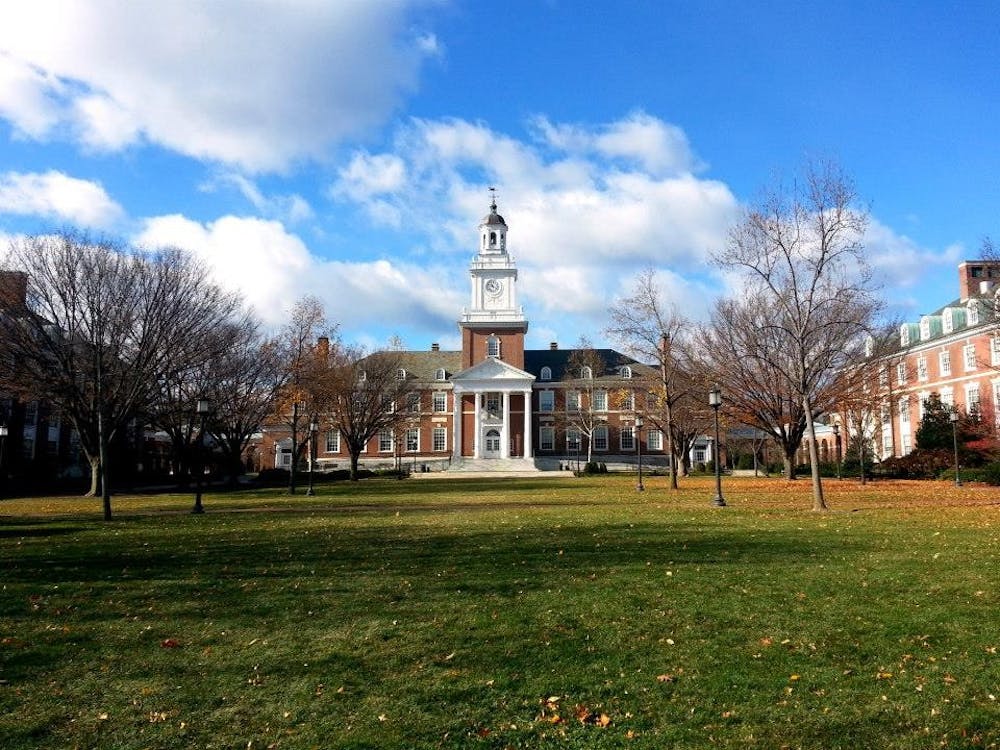The University recently announced the creation of the Agora Institute, an academic institution dedicated to improving civic engagement across the globe.
The Stavros Niarchos Foundation, an international philanthropic organization that funds cultural projects related to the arts, education and public health, pledged $150 million in June to create the institute in collaboration with Hopkins. The foundation has committed more than $2.4 billion in almost 4,000 grants to nonprofits around the world.
Ten new permanent faculty members along with 10 visiting scholars will staff the Institute. Many of them will teach classes, increasing the course offerings for undergraduates, particularly in the social sciences. The new faculty will be members of both Agora and various corresponding University departments.
The Agora Institute is also expected to have its own laboratory, which will engage with policy makers, non-governmental organizations and other groups in order to conduct applied research to help governments and policymakers make decisions and effect change. Undergraduate students will have opportunities to work as research assistants with the Agora faculty.
Provost and Senior Vice President for Academic Affairs Sunil Kumar elaborated on plans for the lab.
“Basically the same way a lab now uses undergrads... in say biology, [The Agora Lab] will be similar except it will be an experience in applied social science,” Kumar said.
In addition to the lab, the Agora Institute intends to sponsor public lectures and seminars, led by both its permanent and visiting scholars, which will be open to undergraduates.
In this aspect, the Institute takes inspiration from the original Agora marketplace in ancient Athens. The original Agora was a hub for civic discourse within the democratic city-state.
Agora hopes to complement already existing departments by providing a place to implement practical changes based on research.
Kumar elaborated that, for example, while the psychology department might conduct research on how individuals engage with people with opposing views, Agora could complement this research by bringing together visiting experts who disagree with one another on a specific issue and allowing them to engage with one another.
According to Kumar, the ability to bring in visiting experts with different opinions makes Agora unique.
“It’s rare that an academic department can provide a platform for which external visitors can engage with each other,” he said. “Agora is designed to be such a platform. It’s designed to be a platform in which external visitors can engage with our faculty and students, but also with each other.”
Agora hopes to foster interdisciplinary collaboration by bringing in experts from diverse academic backgrounds such as political science, psychology, neuroscience, philosophy, ethics, sociology and history.
Kumar explained that Homewood campus was chosen for its large breadth of departments.
“There is a long list of potential departments that could have close connections with Agora,” he said. “Therefore, Homewood is the natural location for it.”
A portion of the money granted by the Stavros Niarchos Foundation will go toward creating a new building on the Homewood campus for the institute. Administrators still have not decided on the exact location of the building and at this time could not give any information as to when construction will start or end.
Aside from the money allocated to the building, the rest of the funds will be put into the University’s endowment. The interest from the endowment will then be used to pay faculty and support research.
Kumar said that the current political climate played a large role in the decision to create the Institute, which he hopes will help alleviate political tensions.
“This is a time where there is some significant polarization and some erosion of democratic institutions,” he said.
Kumar explained that in establishing the Institute, the Stavros Niarchos Foundation was reacting to polarization on a global level.
This is not the first time the Stavros Niarchos Foundation has supported institutions at Hopkins. The Foundation supported both the Berman Institute of Bioethics and the Stavros Niarchos Foundation Parkway Theater where the Maryland Film Festival is held.
It will likely be at least several months before students begin to see the presence of Agora on campus, as the Institute must first decide on a director who will hire the other faculty members. The University has recently created a search committee for the new director, but the committee has not yet sent out a public call for applications.
Professor Adam Sheingate, chairman of the department of political science, wrote in an email to The News-Letter that the department expects to collaborate with Agora.
“The political science department is looking forward to participating in the Agora Initiative,” Sheingate wrote in an email to The News-Letter. “Once in place, the faculty and programs associated with the initiative will speak to some of the most pressing issues of our current political moment.”
Sophomore Kristin Saroyan supported the creation of the institute.
“I think the establishment of this institute is timely and necessary,” she said. “Our current political climate could certainly benefit from its interdisciplinary approach to reducing polarization.”
Sophomore Natalie Wu believes the Agora Institute is a good idea, but worries about its accessibility.
“My hope is that it doesn’t become too much of a bubble for the academic elite and that it is more open to the general public,” Wu wrote in an email to The News-Letter. “I’m all for research and scholarly debate... but will it be something accessible to the wider Baltimore community?”





